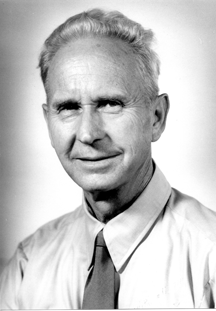Rulon C. Allred
Rulon C. Allred (March 29, 1906 – May 10, 1977) was a leader in the Mormon fundamentalist movement and the Apostolic United Brethren (AUB), a group that practices polygamy. His life and leadership were marked by controversy, including conflicts with the law and disputes with other fundamentalist groups.
Early Life[edit | edit source]
Rulon Clark Allred was born in Lovell, Wyoming, into a family with deep roots in the Church of Jesus Christ of Latter-day Saints (LDS Church). However, his family was sympathetic to the practice of polygamy, which the LDS Church officially abandoned in 1890. This background influenced Allred's later religious beliefs and practices.
Religious Leadership[edit | edit source]
In the early 1930s, Allred became involved with the Council of Friends, a group of Mormon fundamentalists who sought to continue the practice of polygamy. Over time, he emerged as a prominent leader within the Mormon fundamentalist movement. In 1954, after the death of Joseph W. Musser, a key leader in the movement, Allred became the head of the Apostolic United Brethren.
Under Allred's leadership, the AUB sought to distance itself from the more controversial practices of other fundamentalist groups, such as the Fundamentalist Church of Jesus Christ of Latter-Day Saints (FLDS). Allred emphasized the importance of living a Christ-like life and adhering to the principles of the original teachings of Joseph Smith and Brigham Young, the founders of Mormonism.
Conflict and Controversy[edit | edit source]
Allred's tenure as leader of the AUB was not without controversy. He faced opposition from both within the Mormon fundamentalist community and from the broader society. One of his most notable adversaries was Ervil LeBaron, leader of the rival fundamentalist group, the Church of the Firstborn of the Fulness of Times. LeBaron considered Allred to be an apostate and allegedly ordered his death.
Assassination[edit | edit source]
On May 10, 1977, Rulon C. Allred was assassinated in his office in Murray, Utah, by two women believed to be acting on the orders of Ervil LeBaron. His death marked a significant moment in the history of Mormon fundamentalism, highlighting the deep divisions and conflicts within the movement.
Legacy[edit | edit source]
Rulon C. Allred's legacy within the Mormon fundamentalist movement is complex. To some, he is remembered as a spiritual leader who sought to live and teach the principles of his faith as he understood them. To others, his leadership represents a period of conflict and division within the movement. Despite the controversies, Allred's impact on the development and shaping of Mormon fundamentalism in the 20th century is undeniable.
This <a href="Religious leader" title="Religious leader">religious leader</a>-related article is a <a href="stub" title="stub">stub</a>. You can help <a href="WikiMD" title="WikiMD">WikiMD</a> by expanding it.
Search WikiMD
Ad.Tired of being Overweight? Try W8MD's physician weight loss program.
Semaglutide (Ozempic / Wegovy and Tirzepatide (Mounjaro / Zepbound) available.
Advertise on WikiMD
|
WikiMD's Wellness Encyclopedia |
| Let Food Be Thy Medicine Medicine Thy Food - Hippocrates |
Translate this page: - East Asian
中文,
日本,
한국어,
South Asian
हिन्दी,
தமிழ்,
తెలుగు,
Urdu,
ಕನ್ನಡ,
Southeast Asian
Indonesian,
Vietnamese,
Thai,
မြန်မာဘာသာ,
বাংলা
European
español,
Deutsch,
français,
Greek,
português do Brasil,
polski,
română,
русский,
Nederlands,
norsk,
svenska,
suomi,
Italian
Middle Eastern & African
عربى,
Turkish,
Persian,
Hebrew,
Afrikaans,
isiZulu,
Kiswahili,
Other
Bulgarian,
Hungarian,
Czech,
Swedish,
മലയാളം,
मराठी,
ਪੰਜਾਬੀ,
ગુજરાતી,
Portuguese,
Ukrainian
Medical Disclaimer: WikiMD is not a substitute for professional medical advice. The information on WikiMD is provided as an information resource only, may be incorrect, outdated or misleading, and is not to be used or relied on for any diagnostic or treatment purposes. Please consult your health care provider before making any healthcare decisions or for guidance about a specific medical condition. WikiMD expressly disclaims responsibility, and shall have no liability, for any damages, loss, injury, or liability whatsoever suffered as a result of your reliance on the information contained in this site. By visiting this site you agree to the foregoing terms and conditions, which may from time to time be changed or supplemented by WikiMD. If you do not agree to the foregoing terms and conditions, you should not enter or use this site. See full disclaimer.
Credits:Most images are courtesy of Wikimedia commons, and templates Wikipedia, licensed under CC BY SA or similar.
Contributors: Prab R. Tumpati, MD

